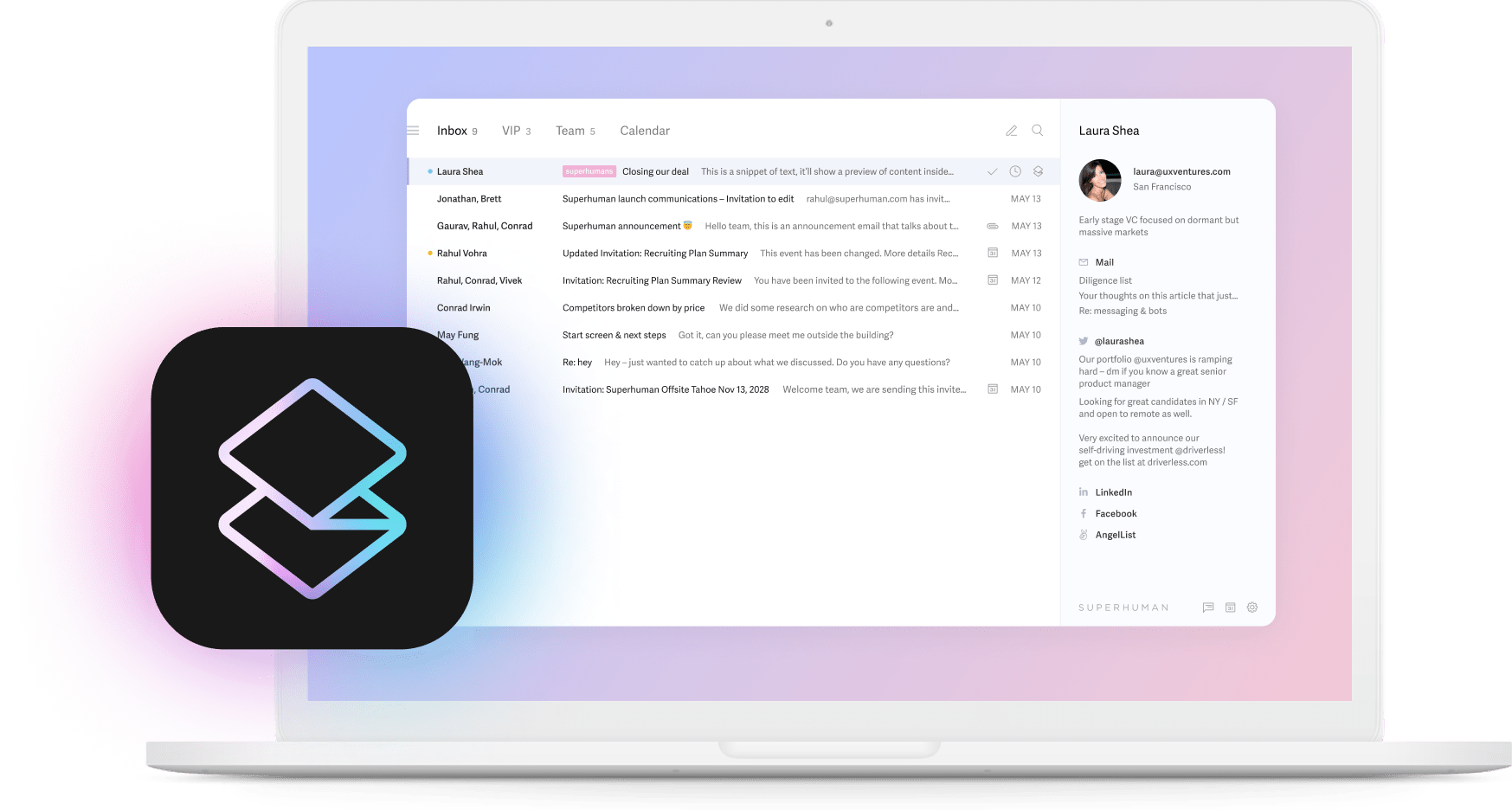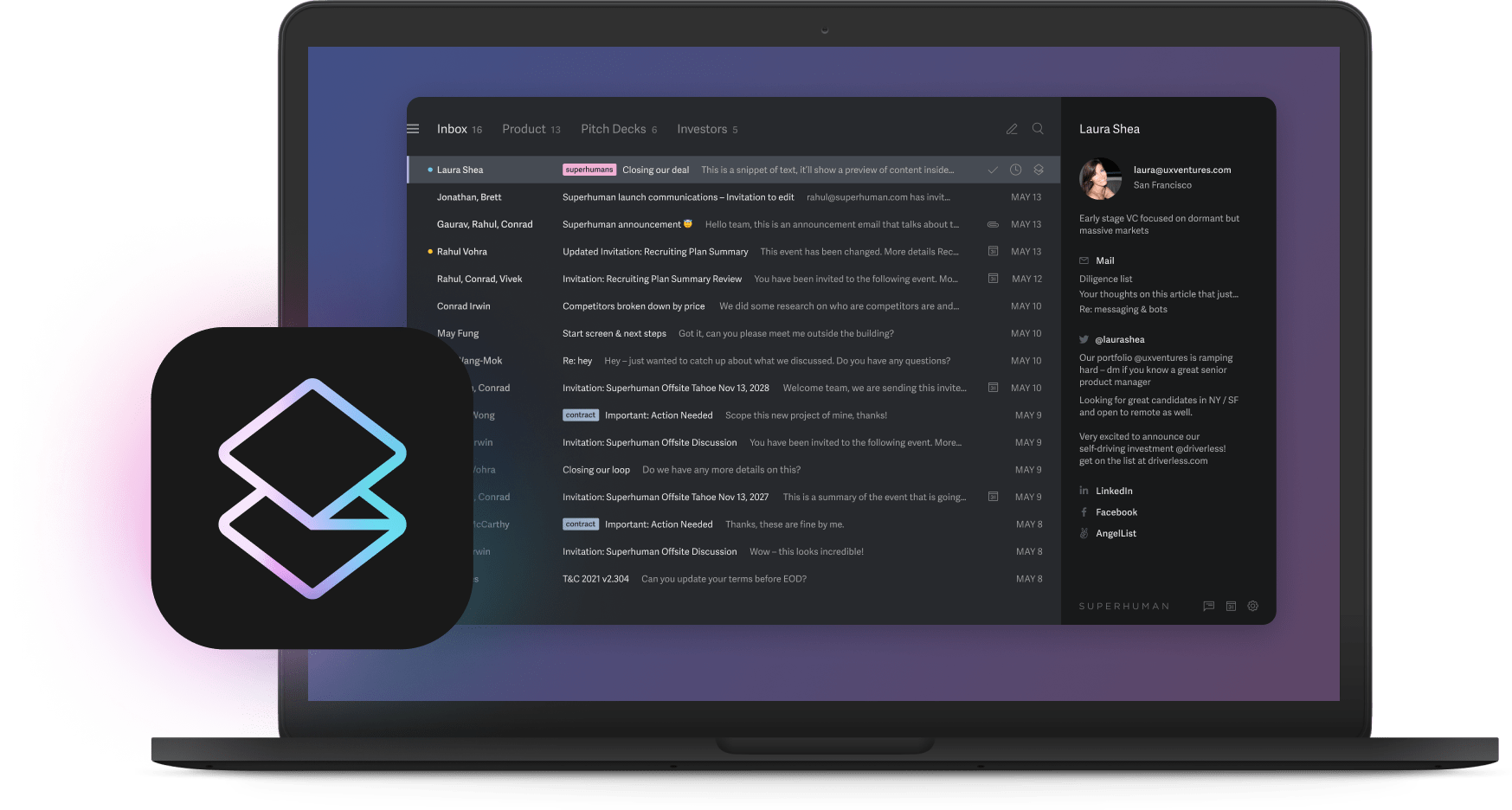
Imagine the most successful CEO you've ever heard of. You know the type: the Tim Cooks, Anne Wojcicki's, and Elon Musk's of the world. It may seem like they have more hours in the day than the rest of us — they'd have to, to have their fingers in that many pies without ever dropping a single ball. In reality, though, those CEOs have the same 24 hours we do — they likely just have a lot of great habits for productivity.
Here's the even better news: you can learn all those same great habits. Below are 33 habits for productivity, all backed by some of the best politicians, thinkers, makers, and entrepreneurs the world has ever seen. Forget productivity hacks — all you really need are the right habits. Read on to learn more.
Small changes are key to lasting habits
Before we dive into the habits themselves, let's talk about how to build a habit.
This can be intimidating, especially when it comes to changing existing habits or eliminating bad ones. It's human nature to be set in your ways!
But while many people think building new habits requires sweeping changes that will be difficult to stick to, that's not the case. Experts actually say that eliminating bad habits and building better ones is best done through making small changes over time — changes you can stick to.
In his book Atomic Habits, productivity expert James Clear summarizes some of the most recent research. What he calls an "atomic habit" is a small change that's easy to make that you incorporate into your routine and practice regularly over time. These are the habits that help build systems to increase productivity, Clear says — they seem small and unimportant at first, but compound into results if you keep making small changes and stick to them over the long-term. He writes:
"Success is the product of daily habits — not once-in-a-lifetime transformations. If you want to predict where you'll end up in life, all you have to do is follow the curve of tiny gains or tiny losses, and see how your daily choices will compound 10 or 20 years down the line".
No matter what new habits you want to establish, the key is to make small steps. For the nine habits listed below, we'll also talk about some of the small steps you can make when starting to implement them.
33 (expert-backed) productivity habits:
At the start of the day
To dive into all the best habits for productivity, let's imagine it's Monday morning at the start of a busy week. You've finished your morning routine and it's time to get to work. Here's how to start your day.
Create a morning routine that sets you up for success
Waking up each day and having a morning routine that helps you prepare to be your most productive self will ensure that every day starts on the right foot.
Many productivity experts will extoll the benefits of a rigorous morning routine that includes a 4 AM start, a workout, and green juice for breakfast. But what's actually most important is creating a routine that leans into whatever helps you feel productive and ready to tackle the day.
Take award-winning entrepreneur and New York Times bestselling author Sophia Amoruso. When asked about her morning routine, she said:
"I wake up, drink coffee, and sometimes go for a walk in my neighborhood. I live up in the hills in LA, so even in the city I get quiet and peace. I play to my strengths: I'm not a morning person, so I like to keep my mornings open, unless I need to schedule early calls. I also don't like working late into the evening, though there are times where I do. I'm most productive between 11 AM and 3 PM, so I generally try to compress everything to the middle of the day — stacking things pretty close together so I'm not tethered to my office".
When creating a morning routine, the first step is to identify your most productive time to work. If you're a morning person who's most creative in the early hours, your morning routine might involve jumping right into a deep work session. But if you find that you don't really hit your stride until the middle of the day, like Amoruso, or even later, build a morning routine based on things that bring you peace or joy — spend time journaling, do some daily affirmations, do a workout, or cook a gourmet breakfast. The key here is that your morning routine should be yours.
When it comes to making small changes that are sustainable, start with just one morning habit that you want to build into your routine. Start performing that habit every day, and wait a few weeks to incorporate more habits into your routine. Remember that building habits is a long game, and your routine is more likely to become habit if you build it gradually over time.
Eliminate unimportant decisions
First up is one of the most-touted habits of productive people: eliminating unimportant decisions.
President Barack Obama once told Vanity Fair that he stopped making decisions about what to wear.
"You’ll see I wear only gray or blue suits", Obama said. "I’m trying to pare down decisions. I don’t want to make decisions about what I’m eating or wearing. Because I have too many other decisions to make."
If that tactic sounds familiar, it's because tons of other famous thinkers and entrepreneurs have practiced it: Steve Jobs and Mark Zuckerberg, to name a few others.
The idea is to eliminate the amount of time you'd typically spend on decisions that don't really matter, so you can instead spend that time on work that does matter. It doesn't just have to be about clothes. Try meal prepping to eliminate decisions about what to eat for lunch, or scheduling a personal training session at the same time every day so you don't have to try to fit the gym into your schedule.
Plan your day
Olympic gymnast Shannon Miller once said, "To this day, I keep a schedule that is almost minute by minute."
Miller may not have known the name of this technique — calendar blocking — or how popular it is in productivity circles. The idea is to plan out your entire day, every day, as a method of time management. It helps you keep track of how you're spending all your time, as well as ensuring you have enough time in the day for all your biggest priorities.
Prioritize
On that note, our next habit is all about prioritizing. It can help to adopt a framework that helps you identify your most important tasks each day.
Dwight Eisenhower developed one that he was famous for usin: the Eisenhower Matrix. On one axis, write "important" and "not important". On the other, write "urgent" and "not urgent".
Then, place tasks from your to-do list in the appropriate boxes. If a task is both urgent and important, do it now. If it's urgent but not important, delegate it to someone else. If it's important but not urgent, make a plan to tackle it later. And if it's not urgent or important, eliminate it from your list.
Delegate and ask for help
Whether or not you use the Eisenhower Matrix to do so, delegating is another important habit for productivity. The most productive people in the world know that they can't do it all — and no one makes it to the top alone. Never be afraid to ask for help, especially if there are too many tasks on your plate for you to finish them all.
"Eat the frog"
One of Mark Twain's famous quotes goes like this: "Eat a live frog, first thing in the morning and nothing worse will happen to you the rest of the day."
We're certainly not saying anyone should actually eat a live frog. Ew. But there's wisdom in Twain's quip: it means you should do your biggest, grossest, or most dreaded task first. That way, with it out of the way, the rest of your to-do list will feel like a breeze.
Decide on fixed times for checking email (and achieving Inbox Zero every day)
Even though email is an essential part of modern communication, we here at Superhuman know just how much it can get in the way of maximizing your productivity. Who can get anything done when they're constantly fielding notifications and new messages?
That's why it's a great practice to designate one or two times each day for checking your email — and keeping it closed outside of those times. Using Superhuman can help you get through your inbox blazingly fast, so you achieve Inbox Zero each time you check your email.
Get started, even if you're not motivated or inspired
In her book Bird by Bird, famous author Anne Lamott told aspiring writers that they need to look through a one-inch picture frame.
What does that mean? It means that sometimes, looking at the big picture can get in our way. Procrastination is often the result of being overwhelmed by how much time there is in the day, or how much we have to get done.
Instead, Lamott says to just start writing, even if you aren't feeling motivated or inspired. Write in a journal, on a grocery list — anything, just to start putting pen to paper. The idea is that by just starting, even with something very small, we start to build the momentum we need to tackle the bigger picture or the long to-do list.
Throughout the day
Once you've gotten your day started on the right foot, use these habits to stay productive throughout the rest of the workday.
Don't multitask
Author Margaret Atwood said, "I'm a person of whim, and easily distracted. I don't like multitasking. When I'm doing one thing, I like to do just that thing."
Atwood was touching on another habit that highly successful people tend to possess: they don't multitask. Through scheduling and prioritizing, you should be able to give 100% to whatever task you're working on at any given moment.
Minimize distractions
"I love the sensation of being out in the open air, far away from all the distractions of modern life. I will usually disappear for a couple of hours, and that time on my bike is quite sacred, as it's when I do all my serious thinking", said Great British Bake Off host Paul Hollywood.
That's another great habit: avoiding distractions. This can mean wearing noise-cancelling headphones while you work, putting your phone away so you don't see incoming text messages and other distractions, using apps like Freedom to block social media during work hours, or setting up an out of office auto-responder to cut back on email — try to identify your biggest distractions, and then do what it takes to remove them.
Optional reading: How to set up a Gmail out of office auto-reply.
Make a "distraction list"
Sometimes, distractions come in the form of work — something you can't exactly put away or block from your phone to avoid.
That's why another great tactic is to create a "distraction list" — a place where you can write down all the small, unrelated tasks, questions, and busy work that pop into your head while you're working on something else. That way, you can quickly clear these potential distractions from your mind, while ensuring that you'll remember to circle back to them later.
Communicate efficiently
Think about the last time you tried to schedule a meeting via email. If you wrote something like, "We need to discuss the pilot project. When are you available?" then it probably took several more emails to find a time that worked for both parties and schedule the meeting.
Another great habit is to practice more efficient communication — by writing better emails. So, a better email to send would be: "We need to meet to discuss the pilot project. Specifically, I'd like to talk to you about the deadline for permits and resources needed to file all the paperwork. I'm available Wednesday at 10 AM or noon. If one of those works for you, feel free to send me a calendar invite."
See the difference? Now, it will take just one more email (or potentially none) for that meeting to get scheduled.
This tip is especially helpful with asynchronous communication like email, which is a huge part of our work lives, especially now that so many people work remotely.
Take breaks
This tip can feel counterintuitive, especially for entrepreneurs who are used to using every productive minute of every day. But you have to take breaks.
Take it from Mayank Kachhwaha, Founder of IndiaLends: "Taking a break is an important stage in the ideation and innovation process. Consciously disconnecting and stepping back for some time can actually help in the synthesis of new thoughts and ideas, in addition to the obvious mental and physical benefits of taking a time-out."
Even a short break can help you recharge and refocus. Next time you feel stuck on a problem (or tired, stressed, or burned out), a 10-minute break away from work might be just what you need to get through.
Use productivity apps and tools
We live in the age of technology — productive people embrace it! There are so many great apps and tools meant to help increase our productivity; finding and using the ones that are right for you is a great habit.
For example, author and CEO Hitha Palepu loves the Forest app for helping her avoid distractions on her phone.
"It locks you out of anything on your phone that might distract you throughout the day", she said. "I use that to help me resist the urge to go scroll on Instagram, for example. I've been using it for years."
Productivity tools don't always have to be apps. A good framework for staying productive and achieving your goals — the GTD framework, for example — is also a great habit to adopt.
Further Reading:
Automate everything you can
Whenever you can take shortcuts to shave time off from repetitive or manual tasks, that opens up more of your schedule for important work. That's why it's a great habit to use tools like IfTTT and Zapier to automate workflows and tasks whenever it'll save you time to do so.
Don't be afraid to say no
Many of us struggle to say no — to extra projects, personal obligations, our coworkers, etc. And that may be killing your productivity.
Being able to say no (sometimes, when it's warranted) is actually a great habit. Award-winning entrepreneur and New York Times bestselling author Sophia Amoruso does so by practicing what she calls "healthy avoidance".
"Avoidance is portrayed as something that isn't a good trait — but I've learned that healthy avoidance can allow things to unfold, and help the important things rise to the top", she said. "You can also avoid things temporarily, to manage your own time."
Long-term habits for productivity
Aside from the habits you practice day-to-day, here are some longer term habits that can help take your productivity to the next level.
Keep your environment productive
Everyone has different needs when it comes to their work environment. Some people like a silent workspace, while others prefer white noise or music. Some people need a dedicated office, while others thrive when they work from a coffee shop, the kitchen table — even the couch.
A good habit for productivity is to know what kind of environment you need to do your best work — and then do your best to work in that sort of environment.
Manage your energy, not just your time
Basecamp CEO Jason Fried once said, "While people often say there's not enough time, remember that you'll always have less attention than time."
Fried was getting at another common habit for successful people: they don't just manage their time; they manage their energy. Time management can only go so far, if your energy is too depleted to take advantage of scheduled or dedicated work time.
A few ways to make sure you're managing your energy, and not just your time:
- Set boundaries and stick to them. It's OK to say no.
- Delegate tasks as needed, especially when it's not essential for you to complete them yourself.
- Make time to rest and recharge. No one can work around the clock without burning out.
Make goals (and take small steps toward them)
Productive people know that setting and achieving goals is a skill that takes practice to perfect. Another great habit to embrace is setting long-term goals, and then taking smaller, actionable steps toward achieving them.
"Sharpen the ax"
There's a famous quote that's often attributed to Abraham Lincoln. Allegedly, he said, "Give me six hours to chop down a tree and I will spend the first four sharpening the ax."
Whether Lincoln actually said that is up for debate. But the sentiment of the quote is still very true — oftentimes, the most important part of a task or project is the preparation you do before you even start. When it comes to productivity, this can take a lot of different forms. But make it a habit to go into your work with a plan, and you'll likely find that it helps you be more productive.
Make deep work a habit
One of productivity expert Cal Newport's most famous concepts is "deep work", or the flow state you can reach when you get so into your work, making progress feels effortless. Deep work is a key to reaching peak productivity, so the most productive people make a habit of practicing deep work and setting aside uninterrupted time for it.
Follow the 80/20 rule
Italian economist Vilfredo Pareto popularized the Pareto principle, better known as the 80/20 rule, when he theorized that in any type of work, 80% of the results come from 20% of the effort.
That's why highly productive people try to identify the most important 20% of their work. If they can zero in on it, they can work to cut down on the things filling up the other 80% of their time, focusing their efforts where they'll have the most impact.
Take care of your health
Your health — physical, mental, and emotional — is the foundation of everything else you do. Taking care of yourself is the first building block of any habits for productivity.
This can mean doing your best to eat nutritious meals, making time to get ample sleep, engaging in self care activities, breaking bad habits (like smoking), and many other things — health is very personal and may look different for each of us.
See failures and setbacks as opportunities to learn and try again
Self-improvement writer Dale Carnegie had this to say about setbacks: "Inaction breeds doubt and fear. Action breeds confidence and courage. If you want to conquer fear, do not sit home and think about it. Go out and get busy."
Carnegie's advice is good for those seeking to be more productive. You will experience setbacks and failures. But it's important not to let them derail your progress. Similarly, don't let perfectionism keep you from taking steps toward a goal. Keep moving forward, even when you're unsure of the path. You'll learn from your mistakes as you go.
Practice good work-life balance to recharge
Finally, at the end of the day, we have one more habit for productivity: seek out work-life balance, and give yourself the time you need to recharge after work.
This is the basis of both your health and your energy. No one can work around the clock, and it's important to consider rest to be the important part of productivity that it is.
Humans are creatures of habit. In fact, we perform 40% of our daily tasks and activities in the same way, every day.
When you look at it that way, so much of your productivity boils down to your daily habits. Are they promoting productivity — or are they standing in the way of you getting as much done as you could?
Luckily, habits aren't set in stone. We can change our existing habits, or we can build and reinforce new ones. And if you're looking for habits to heighten your daily productivity, the nine we've highlighted below will set you on a path to becoming your most productive self.
Use prioritization strategies to narrow down your to-do list
Do you ever feel like you just don't have enough time to get through everything on your to-do list? You know that procrastination isn't to blame — you work all day long — but the list never seems to get any shorter. If this sounds like you, your to-do list itself might be the issue.
Many of us tend to put things on our to-do lists that don't really need to be there. Then, we spend so much time on unnecessary tasks that we struggle to get to the important parts of our jobs. The solution to this is prioritizing your to-do list — making sure only tasks you truly need to do are on your list, and then focusing on the most important tasks first.
There are many different prioritization frameworks that exist, but one of my favorites is the Eisenhower Matrix, based on this quote from former President Dwight D. Eisenhower: "What is important is seldom urgent and what is urgent is seldom important."
With the Eisenhower Matrix, you separate tasks on your to-do list into four categories:
- Urgent and important: tasks you do right away
- Not urgent, but important: tasks you work on once your urgent and important tasks are finished
- Urgent, but not important: tasks you delegate to someone else (or simply eliminate from your to-do list)
- Not urgent and not important: tasks you remove from your to-do list
If your to-do list is particularly long and complex, it might benefit from a prioritization like the Getting Things Done (GTD) method, popularized by author and productivity consultant David Allen. The GTD method uses a step-by-step system to organize and move through long to-do lists quickly.
The GTD method involves five steps:
- Capture: moving tasks from your brain to an external source, like a task manager, which becomes your to-do list.
- Clarify: going through tasks one-by-one to decide whether each one is immediately actionable.
- Organize: Determining the next step for immediately actionable tasks, and putting less immediate tasks onto different to-do lists or in the trash.
- Reflect: Reviewing your inbox to clear out finished tasks and to clarify and organize new tasks.
- Engage: Sorting immediately actionable steps by context, time available, energy available, and priority to determine the order in which you complete them.
Different prioritization frameworks work for different people. If this is a habit you'd like to build, trying different frameworks to see what works for you (and what doesn't) can be a good first step.
Set aside time each week to plan your daily schedule
A great way to be productive is to know what important tasks you have coming up before each workday even begins. For that, it helps to set aside time every week to plan out your schedule for the upcoming workweek.
Many productivity experts (and some of the world's most productive people!) swear by calendar blocking, a practice of designating blocks of time to different tasks and scheduling them into your day ahead of time. The most serious calendar blockers schedule every task, including things like chores, workouts, and personal errands.
But you don't have to go that far. Creating productive habits is all about finding what works for you, so even using a daily planner to set goals or keep track of deadlines for each day can be both effective and efficient.
To start building this habit, see if you can create one calendar block per day. It might help if it's at the same time each day — say, a block of time from 11 AM to noon that's dedicated to a specific task each day. When you plan out your schedule for the week, plan what task you'll work on during that calendar block each day. Then, stick to it — no scheduling calls or meetings, checking email, scrolling social media, or grabbing a coffee during that calendar block. Stick to your scheduled task for the entire block every day.
If this is effective, then over time you can add more calendar blocks throughout your day, and gradually work toward calendar blocking your entire schedule.
Avoid distractions during work time
Digital distractions are all around us, and some (like social media) are even designed to be as addictive as possible.
But the antithesis to distraction is deep work, something you can build into your day when scheduling your week's tasks. This means removing as many distractions as possible — turn off notifications, put your phone in a different room, block time-wasting sites from your browser, put on noise canceling headphones, and whatever else it takes — and doing deeply focused work for a set block of time.
More strategies for avoiding distractions at work include:
- Taking short "distraction breaks" in between sessions of deep work or time spent working on important tasks.
- Removing distracting devices from your workspace.
- Creating communication boundaries with your colleagues (for example, telling them you aren't available to take video or phone calls during parts of the day when you've scheduled deep work sessions).
- Avoiding multitasking whenever possible.
- Using tools meant to help cut down on digital distractions, like OneTab, Forest, Pocket, or Superhuman.
Cut down on unnecessary meetings
According to recent research, the average professional spends 21.5 hours per week in meetings. That's more than half of a traditional, 40-hour workweek! And if those meetings aren't all productive (or even necessary to have), they can create serious barriers to productive work.
Entrepreneur, investor, writer, and speaker Hitha Palepu recently told us about how she learned to say no to meetings, and unlocked powerful potential to get more done in the process:
"One thing I've noticed is that I say no to a lot more meetings now. If I know I don't have anything to contribute, I'll check in to say, 'can you let me know why my participation is required?' I want to make sure I have value to offer. And if not, I'm happy to let it go. This has been a big one".
The first step you can take toward building a habit of avoiding unnecessary meetings is conducting a meeting audit to ensure the ones you have are effective and adding value for all participants. Then, you can remove meetings that aren't valuable or necessary, relying on asynchronous communication tools instead.
Use a time tracker to analyze how you spend your time at work
One of the best ways to increase your productivity is to have a deep understanding of how you actually spend your time at work. Think about it: have you ever had an absolutely packed day, then realized at the end that you were so busy you don't really know what you were working on all day — or if you even accomplished anything important?
A time tracking tool can combat this. Look for a time tracker that has analysis features to help you break down your time at work and see what you work on, the amount of time you spend on different tasks or types or work, and where you might be inadvertently wasting time. Even better if your time tracker is automated so it tracks your work without any manual input.
Some time trackers we love include:
- Toggl Track: a powerful free time tracker
- ATracker: a fully customizable tracking app
- TrackingTime: great for visualizing how you spend your time
- RescueTime: a time tracker and distraction blocker in one
Using a time tracker to better understand how you spend your time is one of the first steps you can take toward building better time management habits.
Use the right tools to help boost your productivity
In addition to a time tracker, there are tons of other powerful technology tools designed to help boost productivity.
From communication tools to task managers, automation tools to virtual assistants, note taking tools, databases, knowledge banks, and more, productivity tools cover a wide range of needs, and anyone should be able to find a tool that helps them streamline their workflows or processes, spend less time on unnecessary work, collaborate more seamlessly with their colleagues, or avoid distractions.
Further Reading:


Create both long- and short-term goals
Many people don't consider that goal-setting is a skill that takes time and practice to master. But setting (and working toward) both long-term goals and short-term goals is a key habit for boosting productivity.
It can help to use a framework to set and achieve goals. One popular option is the SMART Goals framework, for which all goals must be:
- Specific
- Measurable
- Actionable
- Rewarding
- Time-bound
For example, let's say I have a goal to drink more water. That goal is a little vague, so let's adapt it to fit the SMART Goals framework:
- Specific: I want to drink five glasses of water per day.
- Measurable: I will use my iPhone's fitness app to track my water intake.
- Actionable: I will drink my first glass of water when I wake up, and set alarms for refilling my glass throughout the day.
- Rewarding: Staying hydrated helps me feel more energetic.
- Time-bound: I will be regularly drinking five glasses per day within 30 days of setting this goal.
Practicing goal-setting is the only way to get better at it, and it's a great way to keep you on track and productive. To start, identify a short-term goal and apply a framework to make it as achievable as possible. As goal-setting becomes more of a habit, set both long- and short-term goals and work toward them consistently.
Unplug and rest every day
Finally, a habit that often gets overlooked is what you do after work. It's important to make it a part of your daily routine to unplug, rest, and relax to prepare for the next day of work.
This can also include self-care — everything from getting enough sleep, exercising, and eating healthy to nurturing friendships and other relationships, pursuing hobbies, and doing other things that bring you fulfillment outside of work. Self-care is an important tool to combat burnout, which can be an unintended consequence of spending too much time seeking maximum productivity.
At the end of the day, make sure to leave time for yourself — because taking care of your body and mental health has a direct impact on your productivity.
Productive habits start with small steps
No matter which of these habits you want to build into your own life, the key to establishing any habit as a long-term part of your success is to take small, sustainable steps toward it. Starting with one small step today may feel inconsequential, but today's small step is the only way to start building tomorrow's good habit.
To create more time in your schedule for focusing on habits, use Superhuman to save hours every week on email.
33 productivity habits, infinite possibilities
These experts are proof that true productivity can be achieved through discipline, hard work, and good habits. These 33 habits for productivity aren't exhaustive, but some of the best tips we've seen. Use them to lay a foundation, and never stop building more positive habits.


